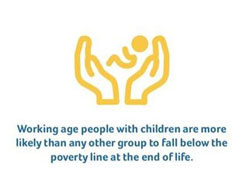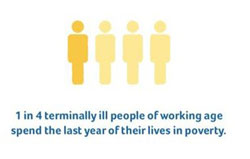As the population ages, works longer, and disease treatments continue to improve, it is highly likely that more people will be working with a terminal illness. Marie Curie and the What Works Centre for Wellbeing share their research and resources to help employers understand how to effectively support members of their staff who have been diagnosed with a terminal illness.
Research by Marie Curie shows that working people who are diagnosed with a terminal illness face a range of difficulties. In addition to the distress of dealing with a terminal illness, individual and household financial wellbeing can be significantly impacted by:
- declining health
- barriers to accessing welfare support
- challenges to maintain paid employment in a flexible manner.
Recent research by the What Works Centre for Wellbeing found that fewer than half of employers have policies for employees with terminal illness.
Terminal Illness definition
The UK’s leading end of life charity Marie Curie defines Terminal Illness as ‘an illness or condition which cannot be cured and is likely to lead to someone's death’.
Workplaces can play a key role in supporting employees at this time as they:
- are where people spend a large proportion of their time and are an important part of the ‘community’ of employees
- can provide stability and social networks at a time that is deeply uncertain and often isolating
- often have resources to provide support through the emotional and practical challenges of a terminal illness diagnosis
Without this support in the workplace, employees who have a terminal diagnosis can experience poorer outcomes in all areas of their life, including mental health and financial wellbeing. Marie Curie research shows that working age people at the end of life are twice as likely to be in poverty than those of pension age.
Case studies
Additional resources
The Work and terminal illness (mariecurie.org.uk) page includes:
- terminal illness and your rights at work
- talking to colleagues about your terminal diagnosis
- leaving work after a terminal diagnosis
- benefits and financial support after a terminal diagnosis
- supporting an employee with a terminal illness
- more information about work and terminal illness.
There is also advice from:
- Marie Cure – How to create a bereavement policy
- What Works Centre for Wellbeing briefing: WWW briefing - Working with terminal illness: what is known and what is needed
- What Works Centre for Wellbeing video: A spotlight on Mental Health, Wellbeing and Support Needs in palliative and end of life care - Joanne and Aradhna - V1 - without on Vimeo
- CIPD: People manager guide: managing and supporting employees with long-term health conditions
- Personnel Today: Four action areas for supporting employees with terminal illness
- UNISON resource: Terminal-illness-03-2019.pdf
- TUC campaign: Dying to Work | Campaigning for Additional Employment Protection for Terminally Ill Workers
- Macmillan Cancer Support – information and information and resources for employers to help them support staff affected by cancer
- Working with Cancer: Blog: Stephen Bevan, Principal Associate, Institute for Employment Studies – A Last Hurrah? Reflections on a Terminal Diagnosis


